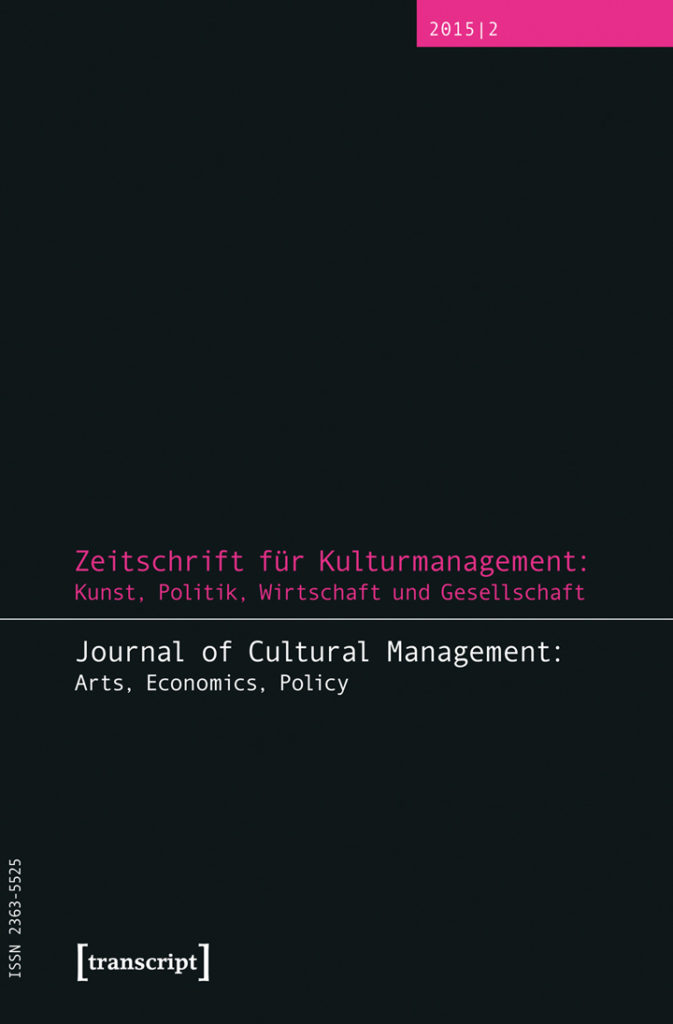Research Article
Kulturpolitik in der Demokratie
Abstract
The present article investigates the legitimacy of cultural politics from the perspective of democracy politics. This question is dealt with on the basis of the Lincoln formula, “government of the people, for the people, and by the people.” Democratic equal liberty can only be implemented on the basis of solidarity among citizens and of the citizens towards the state; culture and the arts can contribute to these forms of solidarity, e.g. by constructing national cultures. In contemporary migration societies, this specific achievement of culture and the arts has, however, become doubtful, and has to be re-defined. Furthermore, culture and the arts are said to contribute to civic education, thereby enabling “government by the people”. Finally, culture and the arts create spaces in which conceptions of the public good can be confronted with each other, i.e. different meanings of “government for the people”.
The second part of the article analyses different forms of financing culture and the arts out of the perspective of democracy politics – public financing, philanthropy, sponsoring, crowdfunding, and cultural and creative industries. In this way, the theoretical considerations of the first part are confronted with practices of cultural politics.
Keywords
2015 (2)
Art, Economics, Policy

Related Articles
Democratization of Culture or Cultural Democracy? Theater in Germany and England
Journal of Cultural Management and Cultural Policy
Research Article
Journal of Cultural Management and Cultural Policy
Essay
Journal of Cultural Management and Cultural Policy
Essay
Lessons in Survival: The De-funding of Restless Dance Theatre
Journal of Cultural Management and Cultural Policy
Essay
Evaluation im kulturpolitischen Wirkungsbereich
Grundprobleme und HerausforderungenJournal of Cultural Management 2017 (1)
Research Article
Journal of Cultural Management 2017 (1)
Case Study
© 2026, Journal of Cultural Management and Cultural Policy
Keywords
- Aesthetics
- Higher Education
- Cultural Diplomacy and Foreign Cultural Policy
- Occupation
- Career and Professional Role
- Audience Development
- Audience Studies and Visitor Studies
- Visitor Motivations
- Business
- Covid Pandemic
- Democracy
- Digitalization
- Diversity
- Third Sector
- Empirical Aesthetics
- Development
- Ethics
- Evaluation
- Field Theory
- Festival
- Film
- Federalism
- Community Arts
- Societal Change
- Ideology
- Staging
- Career
- Communication
- Concert
- Creative Industries
- Creativity
- Crisis
- Culture
- arts organizations, cultural organizations
- Cultural Participation
- Cultural Change
- Fincancing The Arts
- Cultural Promotion Law
- Cultural History
- Cultural Management
- Cultural Economy
- Cultural Organizations
- Art Education
- Cultural Policy
- Cultural Production
- Cultural Sociology
- Art Education
- Cultural Understanding
- Arts Administration
- Cultural Industry
- Cultural Sciences
- Art
- Art Field
- Arts Research
- Artists
- Artistic Research
- Artistic Reputation
- Arts Management
- Arts Organizations
- Art education
- Arts Marketing
- Arts Administration
- Curating
- Leadership
- Literature
- Advocacy
- Management
- Marketing
- Market
- Media
- Methods Development
- Mexico
- Monumentalizing
- Museum
- Music
- Non-Visitor Studies
- Opera
- Orchestra
- Organization
- Political Expression
- Post-truth Politics
- Professional Role
- Audience
- Audience Development
- Law
- Government
- Role
- Socially Engaged Art
- Social Cohesion
- Social Change
- Social Cohesion
- Non-visitor Socio-demographics
- Socioculture
- State
- Symbolic capital
- Dance
- Participatory Justice
- Theatre
- Theatre Governance
- Theory Development
- Tourism
- Transformation
- Survey
- Entrepreneurship
- Urbanism
- Civil Society


